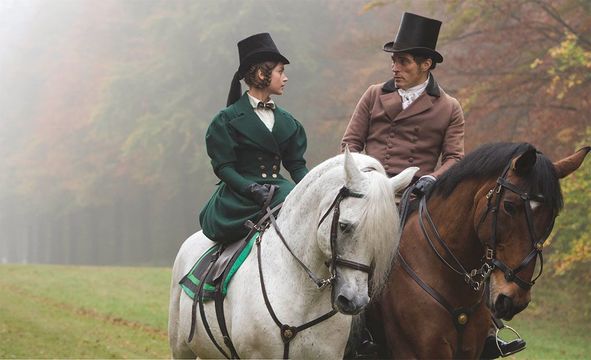
The former Doctor Who star talks about becoming Queen Victoria playing the iconic role and massive reaction the TV series Victoria had.
Since the arrival of Jenna Coleman on our screens as Queen Victoria, we can't picture Britain’s 19th-century Queen as that sad widow in mourning black for much longer. We caught up with the actress about her iconic role.
Opening in 1837, the intensely researched period drama contains political power plays, costumes and, of course, romance—but first, there is friendship: the young ruler’s close relationship with her prime minister, Lord Melbourne, played by Rufus Sewell (The Man in the High Castle). This unlikely bond between the brash teen Queen and her fifty-something mentor helps establish a reign that defined an era. "A great responsibility lies before me and I assure you, I am ready," Victoria says in the opening episode—and so are we.
We speak to Jenna Coleman and Rufus Sewell about taking on the iconic roles.
Read more: Did Queen Victoria really have an affair with a servant?
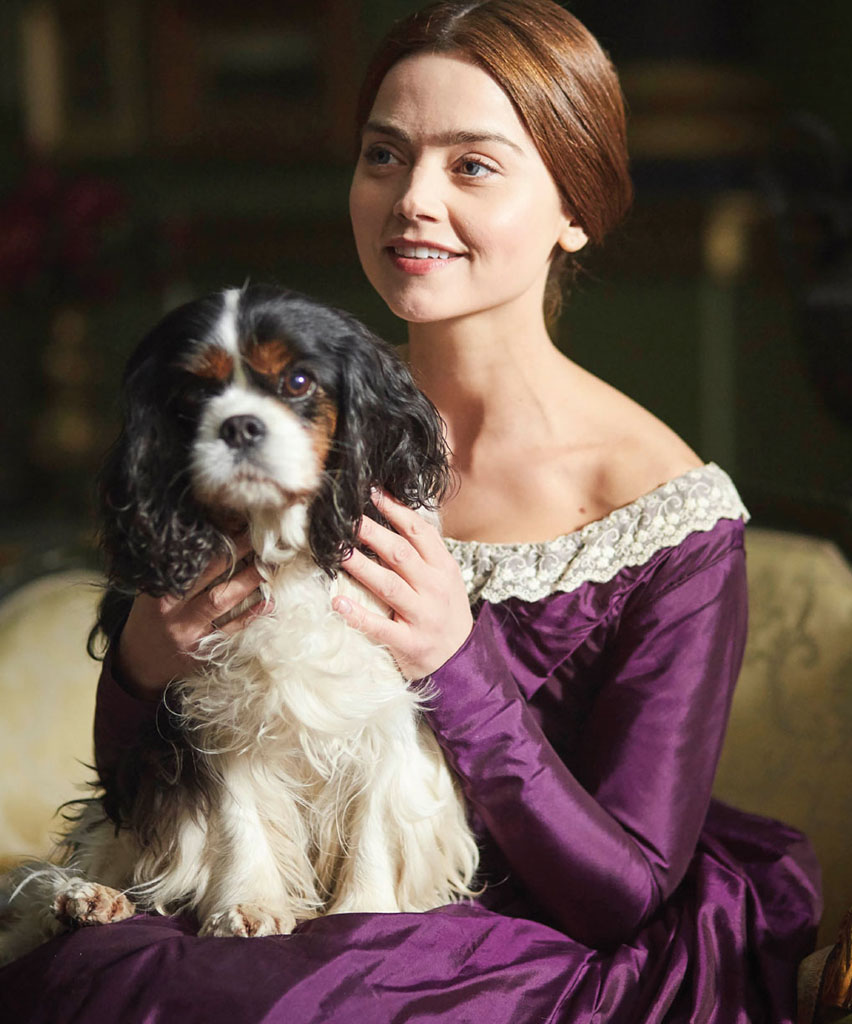
Dash, the Queen’s loyal companion, is played by a King Charles spaniel named Tori, who played the same role in the 2009 film The Young Victoria
I’d seen Emily Blunt in Young Victoria and I knew Victoria was famous for being impulsive and passionate, but that was it. I’d never really considered the extent of her story–that she was only 18 when she became Queen overnight and that she was only 4 feet and 11 inches tall and the most powerful woman in the world at a time when women didn’t even have the vote!
She really took me by surprise. When you read her diaries and other people’s accounts of her, she was so guileless and was not afraid to give her opinion, to say what she thought because of the position she was in. It makes me love her for it. There was no apologizing for who she was and what she thought, whether that be right or wrong.
What surprised you most about her?
How open and passionate she was, and also how artistic. I didn’t know she could sketch. I didn’t know a lot about her relationship with her mother. How dysfunctional it was. She wasn’t particularly prepared for the throne, but she took it on. Thank goodness for Lord Melbourne because she didn’t have a father figure. She didn’t have a mother who was particularly looking after her interests either. I found her fascinating especially as we move on to the [Prince] Albert era. She was very emotionally led and for someone who is on display and has a duty [to the crown], she isn’t really constrained in any way. She leads with her emotions and sometimes acts before she thinks. That wasn’t in keeping with some people’s expectations of her.
Becoming Queen at 18 seems unimaginable. Do you think she had the innate instincts to navigate through the deception around her early on?
One of her flaws became one of her greatest assets. I’ve read a lot about how obstinate and stubborn she was. Once she made up her mind, that was it! You could never change her mind. She would only go forward, she wouldn’t bend, and she wouldn’t go ‘round. Had she not been that way inclined as a young girl, she would perhaps have been manipulated a lot more. There could have been a regency [when others are appointed to administer for the monarch], in which case, history would have been completely different.
She had such a sheltered childhood. Where did her strength come from?
She was an only child and her best friend was her dog, Dash. Before she became Queen she never slept one night alone in her room. The whole reason she kept a journal was that her mother told her to - so she could effectively read her daughter’s thoughts. I think this level of manipulation and control just really hardened her will to fight for independence. That’s perhaps where that fire came from. It became invaluable later on.
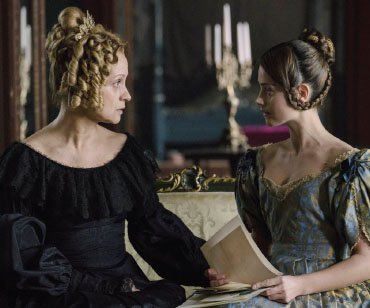
Victoria’s controlling mother, the German-born Duchess of Kent, played by German actress Catherine Flemming
How big a role do you think Lord Melbourne had on her in the early years?
Lord Melbourne appeared at a time when she absolutely needed someone she could trust, rather than manipulate her like a pawn on a chessboard. He listened to her and he didn’t try to control her. I think that was the key difference in that relationship.
Many people know about the love story of Victoria and Albert, but her relationship with Lord Melbourne was a real revelation. What was that like to play?
Rufus was phenomenal. When they told me they were talking to [him] about playing Lord Melbourne, I instantly thought, fantastic! It’s such an unlikely relationship - between the Prime Minister and the Queen. They struck up a genuine friendship and would stay up all night speaking to one another, go riding together, take walks together and have a laugh. Their friendship was kind of blurred - both father-daughter and Queen - Prime Minister. It was a special kind of thing of its own. With Rufus, the two of us just giggled and laughed the whole way through. It became such a wonderful, easy process. Hopefully, that spark of the relationship came through.
The lavish sets and gorgeous costumes really transport the viewer back to 19th Century England. How did all of that help you get into character?
They are so key. They almost do the job for you. Even the blue contact lenses I wear for the show: The moment I put them in and looked in the mirror, I felt I looked totally different. I hadn’t even considered that. Nic Collins, our hair and makeup designer, said it was the first thing you see when you look at her portrait: Her icy blue eyes stare out at you. We went through 75 different pairs of contact lenses to find the right ones! Some of them made me look like a White Walker from Game of Thrones. It was a long process but a rewarding one. In the first [episodes] of the show with the costumes I begin with, I felt like such a little girl. When I did these scenes with all these men and she had to give a speech, I felt so young and it took me ages to realize it was [because of] the costumes. At the early point, she’s still wearing ribbons and puffy sleeves. As we move forward in the series, when she meets with the Privy Council, she’s in-state uniform because she wants to be taken seriously. You really see a shift and a change as she grows up and takes ownership of herself.
It’s amazing the way [the costumes] make you stand, feel and walk on the set. You have to completely forget yourself; otherwise, I would not be able to do the job at all. If I sat on the throne and pretended to be Queen Victoria - I think it’s absolutely ridiculous. It’s the power of the entire world of the set and the people on it that allow you to get lost in that completely.
What was the most challenging thing about playing her?
Technically it was trying to find a voice that could play between being Queen and one that would work when she shut the door and she’s the just Drina - she’s still the teenager. Then falling in love with Albert. You want to find the regal authority and yet keep the accessibility of her being a girl. Being able to move and play between those two things was really, really tricky. Usually, the voice is the thing that comes to me straight away, but this time, the voice was a bit more technical.
The series covers Victoria’s relationships with the two gentlemen of her early reign: Lord Melbourne and then her husband, Prince Albert. What did you learn about marriage?
It’s a really modern story in lots of ways. It’s one of the greatest love stories there’s ever been. They almost were polar opposites that shouldn’t have worked, but they become each other’s yin and yang. What’s so interesting about it is, on top of the love story, we have a marriage in which effectively she’s the boss. In those times, she very much wants to be a wife to her husband - and yet she’s the Queen. How does she navigate that? She’s unwilling to relinquish any of her power, so the power struggle between Victoria and Albert - how they manage their duties and their domestic happiness - becomes really fascinating.
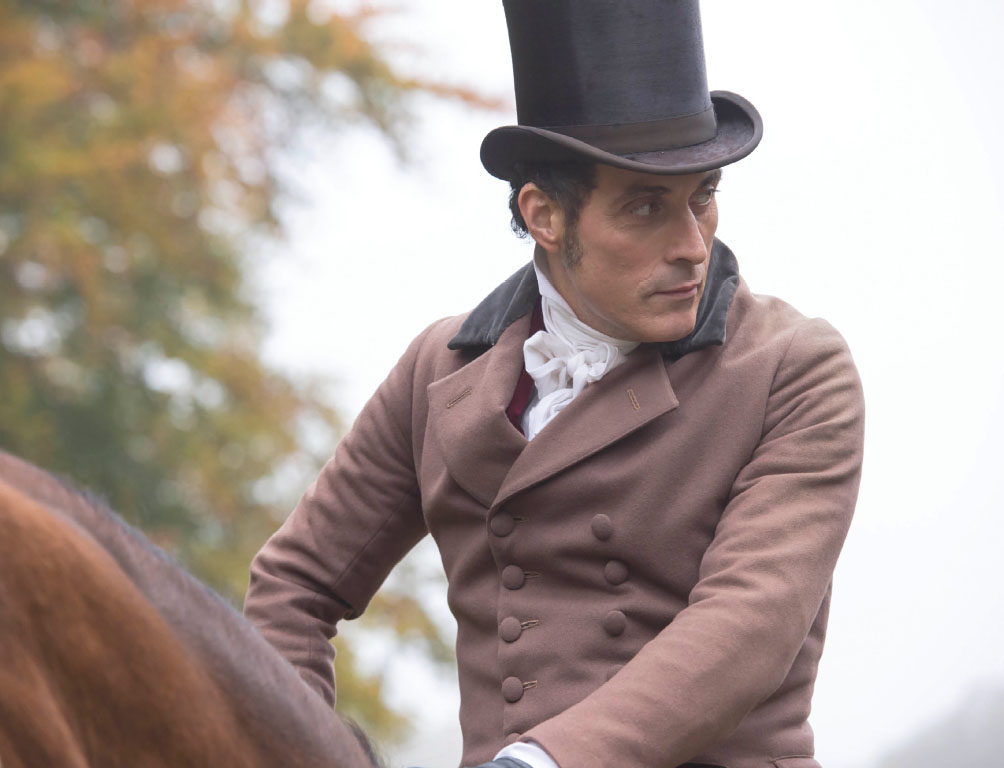
ALL PHOTOS COURTESY OF ITV PLC AND MASTERPIECE
Before Victoria wed Prince Albert, the most important man in her life was the ‘very complex’ Lord Melbourne. Rufus Sewell smolders as the world-weary, much older Prime Minister. Sewell tells BHT about his research, the ‘competing impulses’ of the characters and why Victoria and Lord M’s relationship needed to be dealt with ‘very sensitively.”
What was it about Lord Melbourne that made you want to do this role?
I didn’t know anything about Lord Melbourne until I got the script. I just liked him so much — he has so much kindness, warmth, and intelligence. I related to him, but I’m not saying I’d describe myself that way. He was a much better version [of me] in so many ways. I liked the relationship between ‘Lord M,’ as she called him, and Victoria. It checks off so many literary boxes as a coupling - whether their relationship comes to fruition or not.
I was actually a little bit suspicious that it had been souped up in some way. I thought had it been as it appeared in this script then surely we would have known more about it. It was extraordinary.
Having expressed an interest, I did a little bit of research and read a wonderful biography [of Melbourne] by Lord David Cecil, who is actually a descendant of Lord M, and I kind of fell for him. He was an interesting, very complex, kind, slightly dotty, ingenious and infuriating character. Politically speaking, he had incredible intellect and understanding. He was deft at managing people. Somehow, by appearing to give a little, he managed to stay in power for a very long time. He was a very successful Prime Minister.
The relationship between Melbourne and Victoria certainly seemed unlikely given the age difference?
It was wonderfully written, but I had a couple of concerns about the age difference and how that would play out because it needed to be dealt with very, very sensitively or it could possibly be creepy or manipulative. It was a very fine line. He was in his late fifties, a full 10 years older than me, and Queen Victoria was 15 years younger than Jenna. I love the idea of aging up because it’s something I’ve done before. It felt like a good balance to play it like Jenna and I actually are. I think it works very well.
How would you characterize what Lord Melbourne and Queen Victoria had in those early days?
The fact is there were so many competing impulses in both of them. She was exactly the kind of woman that brought up those romantic feelings he’d given up on, but at the same time, he wanted what was best for her. Alongside those feelings on both sides, those feelings of naughty friends, mates, as we say in England — he was very conscious of his responsibility. When it came time for her to marry, he actually was the one who helped bring about her marriage to Albert, even if it cost him in the end. There was just a tremendous amount of heart that he had. He just wanted her to be happy.
Melbourne had a lot of sadness in his personal life. Was that something you felt was important to play?
Incredibly important. I loved that he had this incredibly rich past that gave him a witty, wistful sadness. He had just been around. He’d made terrible mistakes; he’d been hurt and been abused in certain ways. One of the most touching things about him was the way he was treated by Lady Caroline Lamb. She was married to him when she ran off with Lord Byron and he was publicly humiliated. She was always unstable, and in the end, when Byron treated her abominably, even through his terrible heartbreak, Melbourne reached out to her. He looked after her. When she was mentally ill and broken, he nursed her. I liked the fact that he was honorable, but not in a clichéd way. He was a well-defined character that had a whiff of reality. I believed it.
The series is so cinematic. How much does the incredible period detail help you create your character?
All of that helps a lot, but it’s nothing compared to the quality of the script, the characterization and whether you can believe what you’re doing because, in the end, I don’t really care if we use a cardboard box: If the script and the story are good enough, the characters are well enough defined, then you can make that leap of imagination. It certainly helps that it looks like this on television. These days there is a whole section of the movies that no longer exist. They’ve been replaced rather wonderfully by television. In the absence of the [movie] studios overlooking the people who love that kind of quality work, television has taken over that long-form drama and can actually do more with it. There has never been a better time for television. The money goes not just into costumes but the writers, the directors, and the actors. It’s great for actors.
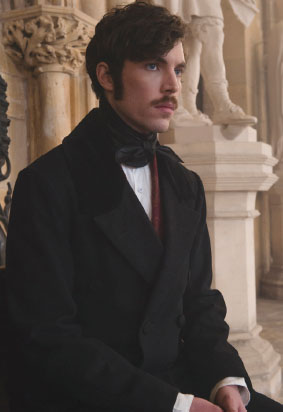
Actor Tom Hughes plays Prince Albert, Victoria’s leading man in the later part of the season
What does that say about America’s enduring Anglophilia that shows like Victoria is so popular here?
I don’t know, but it is true that it’s easier for an American audience to suspend disbelief when they’re watching a show like this. But if you look out the window from your house in London, you certainly don’t see a house like [Downton Abbey]. Americans say, ‘Oh, I’d love to go to England.’ Well, make sure you go to a rich area. Make sure you go to Highclere! The wonderful truth about England is that it’s so much more multicultural and vibrant. To me, [period dramas] are just as completely otherworldly and romantic as they are to an American.
You and Jenna have incredible chemistry in the series. Is that something you knew going in?
There are no rules to these things. The truth is, Jenna and I just really got on and had a lot of fun talking to each other and hanging out. Luckily for us, we were playing the kind of parts where that was mirrored by our characters. All I know is that it was really fun. In certain ways, the truth reflected the fiction. I knew I only had five episodes and Albert was coming on. I’d be out and she’d have a new friend. I also knew, like Melbourne did, that the show must go on and I must hand over the reins. Quite like life.
Read: The truth about Queen Victoria's 60 year reign
* Originally published in May 2017.





Comments